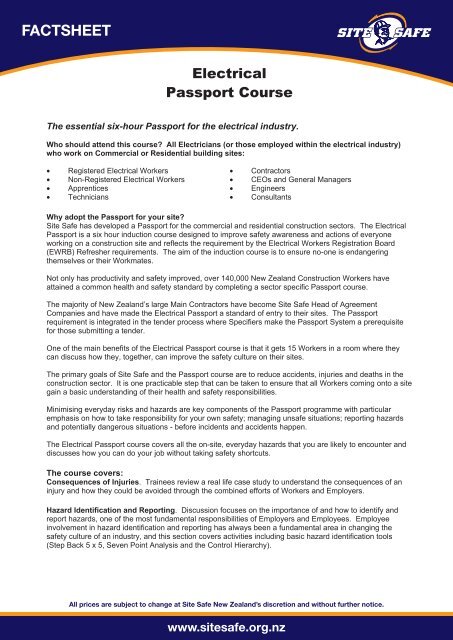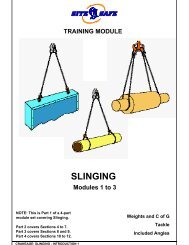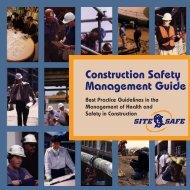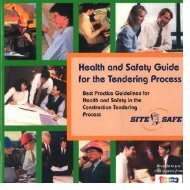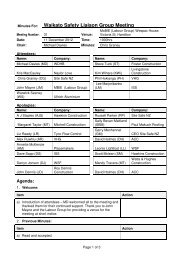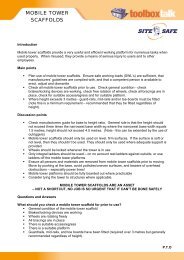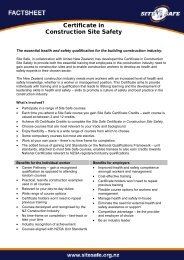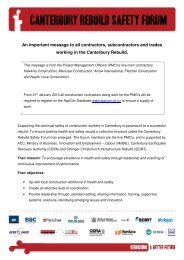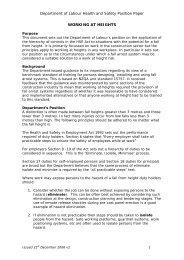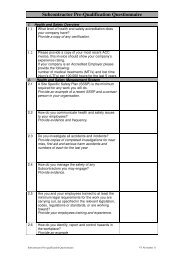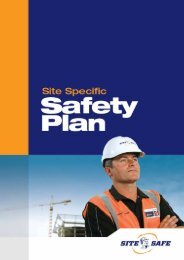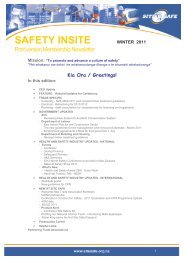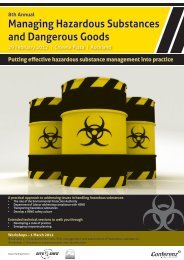FACTSHEET - Site Safe
FACTSHEET - Site Safe
FACTSHEET - Site Safe
Create successful ePaper yourself
Turn your PDF publications into a flip-book with our unique Google optimized e-Paper software.
<strong>FACTSHEET</strong><br />
Electrical<br />
Passport Course<br />
The essential six-hour Passport for the electrical industry.<br />
Who should attend this course? All Electricians (or those employed within the electrical industry)<br />
who work on Commercial or Residential building sites:<br />
• Registered Electrical Workers<br />
• Non-Registered Electrical Workers<br />
• Apprentices<br />
• Technicians<br />
• Contractors<br />
• CEOs and General Managers<br />
• Engineers<br />
• Consultants<br />
Why adopt the Passport for your site?<br />
<strong>Site</strong> <strong>Safe</strong> has developed a Passport for the commercial and residential construction sectors. The Electrical<br />
Passport is a six hour induction course designed to improve safety awareness and actions of everyone<br />
working on a construction site and reflects the requirement by the Electrical Workers Registration Board<br />
(EWRB) Refresher requirements. The aim of the induction course is to ensure no-one is endangering<br />
themselves or their Workmates.<br />
Not only has productivity and safety improved, over 140,000 New Zealand Construction Workers have<br />
attained a common health and safety standard by completing a sector specific Passport course.<br />
The majority of New Zealand’s large Main Contractors have become <strong>Site</strong> <strong>Safe</strong> Head of Agreement<br />
Companies and have made the Electrical Passport a standard of entry to their sites. The Passport<br />
requirement is integrated in the tender process where Specifiers make the Passport System a prerequisite<br />
for those submitting a tender.<br />
One of the main benefits of the Electrical Passport course is that it gets 15 Workers in a room where they<br />
can discuss how they, together, can improve the safety culture on their sites.<br />
The primary goals of <strong>Site</strong> <strong>Safe</strong> and the Passport course are to reduce accidents, injuries and deaths in the<br />
construction sector. It is one practicable step that can be taken to ensure that all Workers coming onto a site<br />
gain a basic understanding of their health and safety responsibilities.<br />
Minimising everyday risks and hazards are key components of the Passport programme with particular<br />
emphasis on how to take responsibility for your own safety; managing unsafe situations; reporting hazards<br />
and potentially dangerous situations - before incidents and accidents happen.<br />
The Electrical Passport course covers all the on-site, everyday hazards that you are likely to encounter and<br />
discusses how you can do your job without taking safety shortcuts.<br />
The course covers:<br />
Consequences of Injuries. Trainees review a real life case study to understand the consequences of an<br />
injury and how they could be avoided through the combined efforts of Workers and Employers.<br />
Hazard Identification and Reporting. Discussion focuses on the importance of and how to identify and<br />
report hazards, one of the most fundamental responsibilities of Employers and Employees. Employee<br />
involvement in hazard identification and reporting has always been a fundamental area in changing the<br />
safety culture of an industry, and this section covers activities including basic hazard identification tools<br />
(Step Back 5 x 5, Seven Point Analysis and the Control Hierarchy).<br />
All prices are subject to change at <strong>Site</strong> <strong>Safe</strong> New Zealand’s discretion and without further notice.<br />
www.sitesafe.org.nz
Training and Competency. This part of the course discusses the nature of safety training and competence, and will<br />
help Trainees recognise when they need training and it will help them recognise when they are not trained or fully<br />
competent to implement controls (such as using harnesses, dangerous plant, etc.) Trainees will understand when they<br />
need to get further help from their Boss to avoid harm. There is also a practical Training Demonstration that helps<br />
reinforce the levels of training and competence needed to avoid harm.<br />
Construction Hazards and Controls. This section examines construction activities and the specific hazards and<br />
required controls for each activity. Trainees work in groups and animated images are used to assist Trainees identify<br />
the hazards and required controls associated with specific construction activities.<br />
Construction activities discussed include:<br />
<br />
<br />
<br />
<br />
<br />
Manual Material Handling<br />
Health (including Physical and Biological<br />
hazards)<br />
Fire Prevention<br />
Drugs and Alcohol<br />
Electricity<br />
<br />
<br />
<br />
<br />
<br />
<br />
Mechanical Plant (including Powder Powered Tools)<br />
Mobile Plant<br />
Excavations<br />
Rigging<br />
Ladders<br />
Scaffolds and Harnesses<br />
Improving safety knowledge<br />
To ensure Participants are kept up-to-date with developments in health and safety, and to ensure their health and safety<br />
knowledge continues to improve, Passport holders are required to complete a refresher course every two years.<br />
Electrical Refresher Prescription. This section examines prescribed refresher activities and the specific hazards<br />
and controls covered in legislation and codes of practice for the Electrical Industry.<br />
First Aid / CPR Refresher. An external qualified First Aid / CPR Trainer will take Trainees through the prescribed<br />
refresher activities and the specific requirements covered in legislation and codes of practice for the Electrical Industry<br />
First Aid / CPR Refresher.<br />
Price for <strong>Site</strong> <strong>Safe</strong> Members<br />
Course Type<br />
Course<br />
Years of <strong>Site</strong> <strong>Safe</strong> Membership Loyalty & Discount<br />
Price for Non-<br />
Duration 1 st Year 2 nd Year 3 rd Year 4 th Year 5 th Year + Member<br />
(10%) (15%) (20%) (25%) (30%)<br />
Electrical Passport 6 hours $135 $128 $120 $113 $105 $150<br />
Effective from 1 November 2009 the following course training prices will apply (GST exclusive):<br />
ASSESSMENT<br />
On-course<br />
On completion receive:<br />
• A Electrical Passport (for a non-registered worker)<br />
• or endorsement on the reverse of a Registered Electrical Workers License Card<br />
• A Building Construction <strong>Safe</strong>ty Handbook<br />
• 3 credits towards the Certificate in Construction <strong>Site</strong> <strong>Safe</strong>ty<br />
All prices are subject to change at <strong>Site</strong> <strong>Safe</strong> New Zealand’s discretion and without further notice.<br />
Visit our website at www.sitesafe.org.nz to find and book onto a course near you.<br />
Alternatively phone your regional booking centre at Auckland (09) 6340 365, Waikato/BOP 0800<br />
868 252, Wellington (04) 499 2509 or Christchurch (03) 348 5788.


